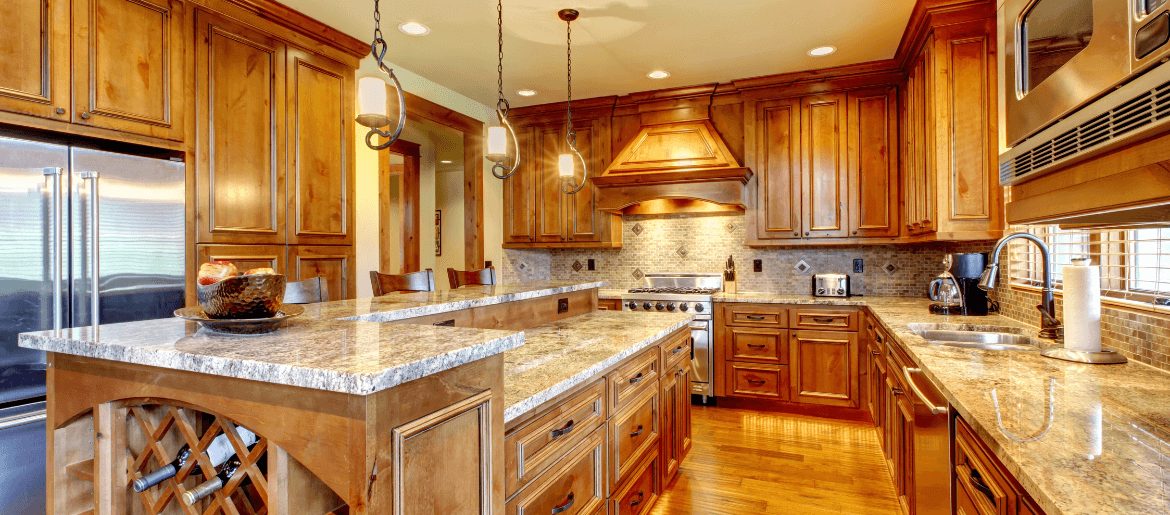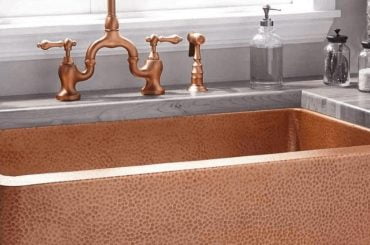Countertops are a very important part of any kitchen. They need to be durable and able to withstand spills and messes. Granite is popular for countertops because it is strong and looks beautiful. But how much weight can granite countertops hold? The answer depends on the type of granite, thickness, construction and how it is installed.
In this blog post, we’ll discuss the weight capacity of granite countertops and some alternative materials that can handle more weight without breaking or cracking. Stay tuned!
Weight Granite Countertop Hold
The strength of a granite countertop depends on its composition and fabrication, but it is generally considered to be one of the strongest materials for countertops. Most granite counters can hold up to 200 pounds or more without any damage, depending upon the exact type of granite used.
It’s also important to consider how evenly weight is distributed across the countertop’s surface, as an uneven load can cause it to crack or break. Supporting and securing heavily used items on your granite countertop is also important to prevent damage over time.
Ultimately, a professional installer can provide you with more specific information about the weight capacity of your particular granite countertop.
What factors might affect how much weight a specific slab of granite can hold safely?
The weight capacity of a slab of granite can be affected by several factors
- Size and thickness of the slab: The larger and thicker the slab, the more weight it can support. However, if the slab is too thick, it may be difficult to install and could require additional reinforcements or supports.
- Texture: Granites with smoother surfaces are generally able to handle more weight than rougher granites because they have fewer crevices and therefore less potential for cracks or fractures.
- Quality: The quality of the granite is also important in determining its weight capacity. Higher-quality granites can handle more weight than lower-quality varieties.
- Density: The density of the granite slab is also an important factor. Granites with higher densities are typically more durable and can support heavier loads than those with lower densities.
- Installation: Installation is also a major factor in determining the weight capacity of a particular slab of granite.
- Stress it is subjected to: The amount of stress that a slab of granite is subjected to can also affect its weight capacity. If it is placed in an area with constantly shifting temperatures or soil conditions, the weight capacity may be reduced due to the increased strain on the material. If a heavier object is placed on top of a slab, the extra pressure could reduce its weight capacity as well.
Are there any precautions you should take if you have a lot of heavy items on your counters?
Yes, there are a few important precautions you should take if you have a lot of heavy items on your counters.
- Make sure the weight of the items does not exceed the counter’s load-bearing capacity.
- Distribute heavier items evenly throughout the counter space to prevent strain or damage on one area of the counter.
- Avoid placing sharp objects on the surface, as they could cut and scratch into it over time.
- Use protective mats, such as cutting boards or placemats, to guard against scratches and other damage.
- Secure the items to the counter space with a rubberized grip or adhesive if possible.
- Clean up spills and messes in a timely manner, before they have time to soak into the countertop material.
- Wipe down the counters regularly with a damp cloth to keep them hygienic and free of bacteria build-up.
- Consider installing counter supports or brackets if there are particularly heavy items that need extra support.
Alternatives to granite if you’re looking for a countertop material that can handle more weight without breaking or cracking?
- Quartz: One popular alternative to granite is quartz. Quartz countertops are composed of natural quartz crystals and a resin binder, giving them an incredibly strong and durable surface that can easily handle more weight than granite countertops.
- Marble: Marble is a beautiful natural stone that is softer than granite but still has the strength to withstand heavier weights.
- Soapstone: Soapstone is also surprisingly strong and durable and its smooth texture makes it easy to clean.
- Concrete: Concrete is a great option if you want a modern, minimal look in your kitchen. It’s highly customizable and can be made to fit any shape or size countertop. Plus, concrete is incredibly durable and can easily handle the weight of heavy items.
- Wood: Though wood countertops require more maintenance and care, they can still be a great option. Wood is naturally strong and durable, making it perfect for kitchens and bathrooms that need to handle heavier items.
- Laminate: Finally, laminate is a great option for those looking for an affordable yet durable countertop material. Laminate is made of layers of paper and plastic which are pressed together, making it extremely resistant to scratches, stains and heat. It also comes in a variety of colors, patterns and finishes to fit any style.
No matter what type of countertop material you choose, it’s important to make sure that it can handle the weight of heavy items.
FAQs – Granite Countertop Weight Capacity
Can you put a sink on top of the granite?
Yes, you can put a sink on top of granite. It is important to make sure the countertop is level and secure before installing the sink.
Additionally, make sure to use silicone caulk when installing the sink for added stability and waterproofing around the edges. It may also be necessary to drill holes in the granite for proper installation.
What are do’s and don’ts for granite countertops?
Do’s
- Use protective mats and trivets to prevent heat damage and scratches.
- Clean countertops regularly with mild soap or detergent and warm water.
- Apply mineral oil periodically to prevent stains, fading and etching due to acid-based foods and beverages.
- Use coasters or placemats to protect the surface from spills and other damage.
Don’ts
- Don’t use harsh chemicals such as bleach, ammonia or window cleaners on granite countertops.
- Don’t cut directly on the countertop; always use a cutting board instead.
- Don’t leave wet sponges or cleaning cloths on the countertop for extended periods of time as it can lead to staining and discoloration.
- Don’t stand directly on the countertop; it could cause cracking or damage.
What are the disadvantages of using granite?
Although granite is an attractive and durable option for kitchen countertops, it has some drawbacks that should be considered.
- Granite is a heavy material, making installation more difficult than lighter materials such as laminate.
- Additionally, since granite is a natural material, each slab is unique and may not match the desired uniform look of a kitchen.
- It is also costly compared to other materials such as laminate. Granite requires regular sealing in order to keep it looking good and prevent staining, which adds to the cost of ownership.
- Finally, granite can crack or chip if dropped or affected by extreme temperature changes.
Final Words
A single slab of granite can support up to 200 to 250 pounds without any problem. However a granite countertop can hold a lot of weight, it is important to remember that each situation is different.
You should always consult with a professional to get the most accurate information for your specific project. Thanks for reading and we hope this article was helpful.





